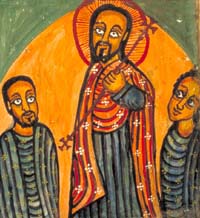Christian origins
 |
 |
 |
A traditional image of Jesus from Ethiopia |
Jesus
Christianity takes its name from the Greek word ‘Christ’, meaning Anointed One, whom Christians believe was Jesus, the son of God. Jesus was born in Bethlehem, near Jerusalem and grew up as a Jewish boy. At about the age of 30 he began three years of travelling and teaching. He taught a new way of drawing upon the Jewish tradition. He called this way the Kingdom of God. He gathered followers and aroused the opposition of the Roman authorities who suspected him of planning a rebellion and had him executed.
The spread of Christianity
After his crucifixion Jesus appeared to his disciples and told them to go out into the world and preach that we are all loved by God and are called to love those around us in response. By around 60 AD Christianity had spread west and north to many parts of the Roman Empire. In 300 AD Armenia became the first officially Christian country. At the same time Christianity also spread east through the Persian Empire as far as China. Since the 16th century European missionaries established Christianity in every continent.
Diverse traditions
Today there are about 2 billion Christians in the world divided mainly among three main traditions: the Orthodox churches in Russia and Eastern Europe, the Protestant churches mainly in Europe and North America, and the Roman Catholic church which is spread everywhere. Besides these are many independent traditions in different parts of the world.
|

